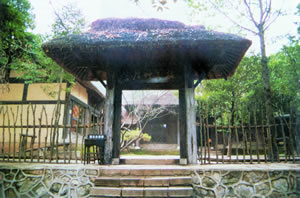 Places that were once the home of a celebrity often become sites of homage for later generations.
Places that were once the home of a celebrity often become sites of homage for later generations.
This certainly applies to Longzhong, a town closely associated with the ancient Chinese statesman and strategist, Zhuge Liang (AD 181-234).
He was the Prime Minister of the Kingdom of Shu in the period of the Three Kingdoms (AD 220-280). Because of his lofty knowledge, he became a symbol of resourcefulness and wisdom in Chinese folklore.
Before Zhuge Liang came to power, he lived in seclusion and farmed in Nanyang, in Central China's Hubei Province. He wrote of his life in his famous story, "Chushi Biao" where he said: "I was originally from a pauper farming in Nanyang, and never thought to come to the front ...".
Wuhou Temple
It's recorded in one of China's four literary masterpieces, "History of the Three Kingdoms", that Zhuge Liang's home was in the Dengxian County, now named Longzhong, 32km from Xiangfan City.
Longzhong has hills on three sides with lots of trees including pinaster, cypress, sweet-scented somanthus and loquats.
Although it's the depth of winter, the loquat trees are still verdant and the leaves of the osmanthus trees are fresh and green.
Going up a hillside path, the visitor will find a series of buildings making up the Wuhou Temple - the main building of Longzhong.
While it's small compared with the Wuhou Temple in Chengdu, capital city of Southwest China's Sichuan Province, it is still very lovely. The gatehouse, principal rooms and the main hall were built to resemble the shapes of the hill and were built a grand scale.
In the hall, several couplets are hung on the columns, making the hall look very bookish. One is like the one in the Wuhou Temple in Chengdu and another is from the tales of the Three Kingdoms.
There are also two couplets written by contemporary celebrities, Dong Biwu and Guo Moruo to express their thoughts and feelings.
Made of black bricks and tiles, Wuhou Temple looks very simple and unsophisticated but it does have an air of mystery about it.
Thatched Cottage
Next to Wuhou Temple is Sanyi Hall where statues of Liu Bei, Guan Yu and Zhang Fei (figures in the Three Kingdoms period) stand ready to receive the reverent attention of visitors.
In front of Sanyi Hall is a courtyard named San Gu where many lovely loquat trees bloom against the courtyard wall. Their shade covers the courtyard making it look very quiet and peaceful.
This is the place where the Shu Emperor Liu Bei made his three calls on the young Zhuge Liang seeking aid. The saying: "Sangu Maolu" (Make three calls at the Thatched Cottage) derives from these events.
As the eminent writer Han Yu said: "Only when there is a Bole (a legendary connoisseur of horses) can there be a thousand-li (very fast) horse."
If there were no Liu Bei, how would Zhuge Liang be able to bring his abilities and wisdom into full play? There is much that later generations can learn from the ancient story.
At the back of Sangu Court is Caolu Gloriette. It's constructed in the Han architectural style with yellow walls, black wood and couch grass. "Zhuge Caolu" (Zhuge Thatched Cottage) inscribed by Guo Moruo is over the doorway.
Across a small river, "Gonggeng Tian" appears. It's farmland of about one mu (1/15 of a hectare) divided into several sections but with no crops planted. On one side of the field is a small, limpid pond where the reflection of wizened lotus leaves can be seen. It's unknown whether Zhuge Liang once ploughed and cultivated plants here and the field is now a symbol of this.
At the entrance to the road to the furthest hill stands a big bluestone tablet on which is incised, "Ancient Longzhong" with a couplet on both sides.
It's said that after Zhuge Liang agreed to Liu Bei's request for aid, he said to his younger brother, Zhuge Jun: "I have to go out to assist Liu Bei because of his favour but I'll come back immediately once we succeed. You shouldn't let the field lie waste."
However, Zhuge Liang was not able to anticipate what his own end would be. He died of old age on his seventh expedition against Wei.
(Shanghai Star February 14, 2003)
|

